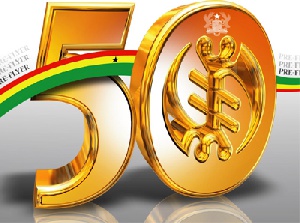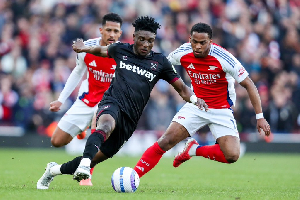On March 6, 1957 Dr. Kwame Nkrumah and others won for Ghana her political independence from Britain. The primary purpose of Ghana’s political independence was to allow Ghanaians to develop their own country in the directions they so desired without unnecessary interferences of our colonial lords. As Dr. Kwame Nkrumah, the leader of the doyens of Ghana’s independence eloquently articulated in reply to a speech delivered by the Duchess of Kent on behalf of the Queen on the Independence Day --- “My government fully realizes both the advantages and the responsibilities involved in the achievement of independence. It intends to make full use of these advantages to increase the prosperity of the country.” Certainly the attainment of independence can be likened to a tongs. On the one hand, it is a huge window of opportunity to chart independent political, social, and economic courses that best suit the nation, without seeking an approval from our colonial masters. On the other hand, it is a massive responsibility to better the lives and conditions of the people; a responsibility that entails hard work, sacrifice, perseverance, and sound judgment to prove to both future generations and our former colonial masters that we are worthy of our independence.
Having realized the inseparable relationship between politics and economics, the leader of the doyens of Ghana’s independence quickly embarked on the task of national reconstruction in the field of education, health care, hydroelectricity, agriculture, housing, and transportation with the object of increasing the prosperity of Ghanaians. Most important of all, the leader of the doyens of Ghana’s independence formulated policies and programs to forge national unity in order to eliminate division based on ethnicity and tribalism. Indeed Ghana made giant strides in these areas of social, cultural, and economic development in those early days. The leader of the doyens of Ghana’s independence also used the newly-won political capital to help other African countries to liberate themselves from colonial rule. Thus, Ghana took a forefront position in the liberation of the African continent from European and Arabic colonialism. It also became a beacon of hope and inspiration for the peoples of African descent and others every where who were seeking freedom from colonial domination and exploitation.
Events following the demise of the leader of the doyens of Ghana’s independence have demonstrated not only the utter meaninglessness of our independence but also our sheer irresponsibility to maintain the elemental development laid down by the doyens of Ghana’s independence. The quality of our educational institutions and their graduates has deteriorated rapidly. Our educational system from primary to tertiary institutions is facing pathology of purpose and vision, culminating in producing graduates who lack the skills and knowledge to contribute meaningfully to the country’s development. Ghana once a touch bearer of education in the sub-Saharan Africa has now assumed a subordinate position in the filed; its education system has no significant vision or purpose to either its political independence or economic prosperity. Countries such as Mozambique, Tanzania and Solomon Islands outscored Ghana in primary, secondary, and tertiary enrolment statistics in the 2004 Human Development Index (HDI). Burundi scored approximately 60% and Ghana 57% on adult literacy rate in the HDI of that year. The sad thing is that these countries were still under a colonial rule when Ghana became independent and embarked on its social-economic development projects. Assuming that quantitative data is not enough to give us a true portrait of the state of Ghana, what about qualitative data in the form of observations and experiential narratives? My observations and those of many others lend a massive support to the HDI statistics.
Similarly, Ghana’s agricultural production has plummeted, making Ghana a net-importer of food. While in exile after his government was toppled by CIA-engineered coup, Nkrumah heard about the U.S pledge of food aid to Ghana. And he angrily responded, “Ghana is not a hungry country”. But little did Nkrumah realize that Post-Nkrumah Ghana was going to be an importer of everything including frozen chicken legs, fatty turkey tails, and salted pig feet. In addition, Ghana has lost its enviable position as the world leading producer and exporter of cocoa beans. In the field of health, my observation and experience is that Ghana is totting on the brink of sanitation catastrophe, as old drainage systems built in the early 1960s in our cities have collapsed, public toilets have become environmental eye score, the rate of slums are increasing, and a growing mountains of garbage are competing for human living spaces! All these have increased the vectors of mosquitoes, facilitating malaria transmission and the spread of other preventable diseases such as cholera and dysentery. Today malaria pathogen ranks the number one killer in Ghana, followed by road accidents. As our road fatalities mount, the post-Nkrumah’s government of NPP looks helpless and its only plan of action is to ask the public to increase their prayers for divine intervention on our roads to prevent more fatalities. It is so unfortunate that post-Nkrumah governments conceptualized health in terms of the biomedical model, with its preponderant emphasis on the availability of hospitals, clinics and prescription drugs rather sanitation and nutrition.
What about national unity index (NUI)? The NUI is my own social barometer that measures the degree of national cohesion marked by inter-tribal/ethnic marriages, apprehension, and interactions, tribal/ethnic motivated stereotyping, written, verbal and physical attacks, ethnic/tribal representation in the public service and ministerial positions, feelings of marginalization in national affairs, residential segregation, etc. Though the NUI is not formally compiled in Ghana, any Ghanaian well-informed about our social affairs is perhaps aware that the NUI is in a nose-dive position in response to the law of gravity. The NUI plummeted deeper in the period 1980’s, 1990’s and part of the 2000’s as tribal/ethnic tension started rising steadily. Both military and civilian governments in post-Nkrumah period did not only prove ineffectual in forging national unity; they gave an impetus for tribal/ethnic tension through the distribution of development projects, political inflammatory statements, and marginalization of the voice of other tribal/ethnic groups in national governmental affairs.
The NUI is crucially important because our colonial masters manipulated it to their advantage by pitting one ethnic group against other and using the multi-ethnic nature of our society to justify the existence and perpetuation of colonial governance. One should expect that post-Nkrumah governments would make policies and measures aimed at forging and strengthening national unity. So far our national record in this area has been dismal to say the least, because we still have “Zongos” in southern towns and cities where the residents are mostly people of Northern extraction. “Zongo” is veritably an apartheid system, a residential segregation based on social class and ethnicity. In his political writings Dr. J.B Danquah passed strident criticisms on the colonial government for allowing Ghanaians to live in squalid. I bet my last dollar that Dr. Danquah would be stunned if he were informed in his grave that Ghanaians who live in squalid conditions at the moment are those of low social class and stigmatized ethnic groups. Social class and ethnicity have now replaced race as a crucial factor in deciding one’s residence in Southern towns and cities.
Not only have post-Nkrumah governments failed to exercise their responsibilities to increase the prosperity of Ghanaians, they have also brought opprobrium upon the doyens of Ghana’s independence by panhandling every nook and cranny of the globe for loans, grants, and aids. Panhandling has become such an integral part of Ghana’s political establishment to the extent that it is now tacitly a cardinal skill required of the next president of the country. It is only a matter of time for the country to appoint minister of begging. However, as Arthur Kennedy NPP presidential aspirant has thoughtfully observed, “No country in the history of the world has successfully begged itself into prosperity”. This empirical truism must be a standard code of conduct for our political establishment. That said our independence is now analogous to a teenager who decides to move out of his parents’ home to live on his own, fend for himself, be his own boss, and enjoy his freedom without any parental restrictions. Barely two years passed he came back to the parents from time to time to ask for pocket money, milk, and other foodstuffs. The teen could hardly feed himself. Then the parents decided to lay down strict conditions for borrowing of money and foodstuffs. The teen had no options but to accept those conditions. Now tell me, how independent is the teenager after he accepted the parental conditions? Analogically, our independence is not different from that of the teenager.
In light of the above analysis and analogy, what is our justification for planning to spend an amount of 20 million dollars for Golden Jubilee independence celebrations on March 6, 2007? Defenders of our independence celebrations may argue that we should celebrate our freedom from colonial rule with wine, beers, pitoo, and music. Sure, we have to remember the occasion but not with wine, beers, pitoo and music! Doing so implies that we have chalked some tangible achievements after independence worthy of celebrating or rejoicing. In fact, we have absolutely no tangible accomplishments to show for it. The sad truth is that we are still a client state of the West. Our national budget consists of more than 80% inflows from the West--- credits, grants, loans, gifts, you name it. Our status as colonial subjects has not substantially changed; it has metaphorically only changed from iron chains to gold chains, so to speak! Apparently both iron and gold shackles restrict freedom, making us vulnerable to massive domination and exploitation. Here I am not talking about superficial trappings of independence such as the national flag, currency, anthem, parliament, and presidency. Nor am I referring to having a national constitution and cabinet ministers who go around doing practically nothing except lording it over the people and plundering the national treasury. These are at best simulacra of independence rather than real independence.
Ghana is really independent when it is able to enact appropriate policies and programs and implement them to make the lives of its people better than they were under a colonial tutelage and exploitation. A vast majority of the old folks who lived under both British colonial and Nkrumah administrations will testify that the quality of life was far better than post-Nkrumah era. On the contrary, Ghana is still colonized when crucial decisions affecting its economy are decided in the colonial or imperial metropolitan capital cities of Washington, London, Bonn and Paris rather than in Accra by the people of Ghana or their representatives. As a matter of fact, contemporary practices of colonialism do not require the presence of the colonial masters in Ghana. The colonial masters could easily maintain their hegemony on Ghana through several remote controls, particularly the ruling elite in Ghana. Ghana is also colonized when its small political elite with an endorsement from their external colonial masters are exploiting the resources of the country and plundering the national exchequer for their own profit.
Ghana is still colonized and dependent when the only hope for its youth is to travel to the West as economic refugees and cheap sources of menial labour. Now tell me how independent is Ghana? In a critical sense, real independence would take place in Ghana when it is able to rid itself of both external and internal colonialists. Internal colonialists as parasites and vampires are not worst than their external counterparts, after all colonialism has the twin objects of dominating and exploiting the people for the exclusive benefit of the colonialists. As well, real independence would take place in Ghana when its citizens and leaders are imbued with the spirit of patriotism to construct a unique nation-state different from the deplorable image traditionally associated with an African state in the international community. It is common knowledge that no nation-state has developed successfully without its citizen having a spirit of patriotism. The spirit of patriotism is a source of motivation that drives one—both leaders and citizens—to do things that will benefit the common good in their nation-state. The spirit of patriotism goes beyond individual self-interest, benefit, and profit and makes the collectivity its ideological focus. A patriotic Ghanaian will ask him/herself the following questions before taking any personal or professional decisions: How will it benefit the people of Ghana? What damage will it do to Ghana socially, culturally, and economically? How will it impact on the image of my country in the international community? How will posterity judge my action?
So what should we do on March 6, 2007? Instead of indulging in celebratory activities, giving ersatz speeches, organizing drinking binge, and arranging flamboyant parties, the occasion should be used for two principal activities. First, we should remember the lives, sacrifices, and philosophies of the doyens of Ghana’s independence. This includes the big six--- Dr. Kwame Nkrumah, Dr. J.B Danquah, Obetsebi Lampty, Akuaffo Addo, William Ofori Atta and Ako Adjei. It also includes Kojo Botsio and kanla Agbeli Gbedemah. This is because they had unselfish intentions to make Ghanaians masters of their own destiny—to found a nation-state whose people have pride in themselves and have access to quality human services. Today they will be turning and tossing in their graves and whispering to themselves whether they did the right thing-- the Ghana they perceived is totally different from the Ghana that we have been experiencing since their departure. Contemporary Ghana is sinking deeper and deeper into the abyss of poverty, social chaos, and dysfunction. Please do not judge Ghana’s economic progress by the masses of the people whose teeth are stained by poverty; who have no access to drinkable water; who do not eat nutritious meals; who live in squalid residence; rather than handful few Ghanaians who have amassed tremendous wealth through drug trafficking, looting of the national exchequer, bribery, and influence peddling.
Second, the occasion should be used for a deep national reflection on the extent to which we have failed to fulfill our independence responsibilities; review our political history to find out what went wrong; what ails our contemporary society and what could we as members of the government, business people and individuals do to rescue our country from deterioration or backwardness. We should also use the occasion to chart a new social, political and economic direction for the country. At the community level, community centre and town hall meetings and debate sessions could be conveyed for that purpose. Parades and gatherings could be organized for both adults and the youth to conscientize them about new citizenry attitudes, civil responsibilities and accountability. At the regional and national level plenary debate sessions should organized about the themes I have indicated above. That way, our independence day would be meaningful instead of painting a false portrait of accomplishments and displaying bloated feelings of free-Ghana.








![Former President Akufo-Addo [L] and Okatakyie Afrifa Mensah Former President Akufo-Addo [L] and Okatakyie Afrifa Mensah](https://cdn.ghanaweb.com/imagelib/pics/587/58758132.295.jpg)











